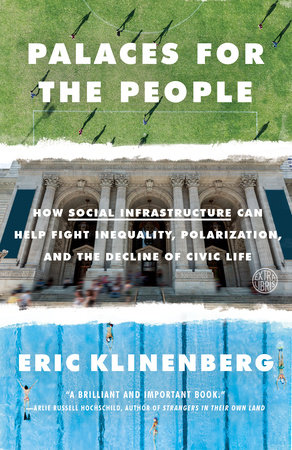New York University (NYU) Professor Eric Klinenberg will speak about the power of social infrastructure in his presentation to the CCA Conference in October.
Eric Klinenberg is Professor of Sociology and Director of the Institute for Public Knowledge at New York University. At the CCA Conference, Professor Klinenberg will draw from his latest book, Palaces for the People: How Social Infrastructure Can Help Fight Inequality, Polarization, and the Decline of Civic Life. Klinenberg believes that the future of democratic societies rests not simply on shared values but on shared spaces: the libraries, childcare centres, bookstores, churches, synagogues, and parks where crucial, sometimes life-saving connections, are formed. Palaces for the People urges us to acknowledge the crucial role these spaces play in civic life. Our social infrastructure could be the key to bridging our seemingly unbridgeable divides—and safeguarding democracy.
Klinenberg’s first book, Heat Wave: A Social Autopsy of Disaster in Chicago, won six scholarly and literary prizes and was praised as “a dense and subtle portrait” (Malcolm Gladwell, The New Yorker), “intellectually exciting” (Amartya Sen) and a “trenchant, persuasive tale of slow murder by public policy” (Salon). A theatrical adaptation of Heat Wave premiered in Chicago in 2008.
Klinenberg has also led a major research project on climate change and the future of cities. Part of this work involves a sociological investigation of Superstorm Sandy (New York, 2012) and the challenge of adapting to the emerging age of extreme, dangerous weather. “Adaptation,” an article from this research, appeared in the New Yorker.
In addition to his books and scholarly articles, Professor Klinenberg appears often on public radio and television. In addition to The New Yorker, he has contributed to popular publications including The Atlantic, The New York Times, Time, Fortune, Rolling Stone, The London Review of Books, Le Monde Diplomatique, and the radio program This American Life.
At NYU, Professor Klinenberg teaches courses on cities, climate change, culture, and media, as well as graduate seminars on research methods, ethnography, and urban design.
Professor Klinenberg will join the CCA Conference remotely via Zoom, in discussion with CCA CEO, Dr Don Perlgut, who says: "Australian adult and community education - ACE - providers constitute classic 'social infrastructure', as they help provide the 'glue' that keeps communities functioning, especially - although not solely - for those who may be disadvantaged or vulnerable. The many hundreds of ACE providers around Australia, many of them in regional and rural locations or in outer suburban areas, are a unique contribution to Australia's educational, training, social, economic and civic life. We are thrilled to hear from Professor Klinenberg, an international expert whose research has helped to identify the crucial elements that make social infrastructure work."
About Social Infrastructure
“Social infrastructure is not “social capital”— the concept commonly used to measure people’s relationships and networks—but the physical places that allow bonds to develop. When social infrastructure is robust, it fosters contact, mutual support, and collaboration among friends and neighbours; when degraded, it inhibits social activity, leaving families and individuals to fend for themselves. People forge ties in places that have healthy social infrastructures—not necessarily because they set out to build community, but because when people engage in sustained, recurrent interaction, particularly while doing things they enjoy, relationships—even across ethnic or political lines—inevitably grow.”






